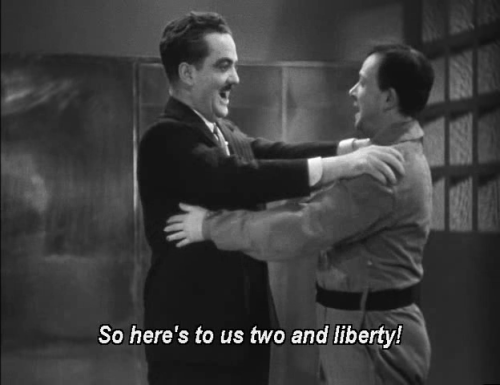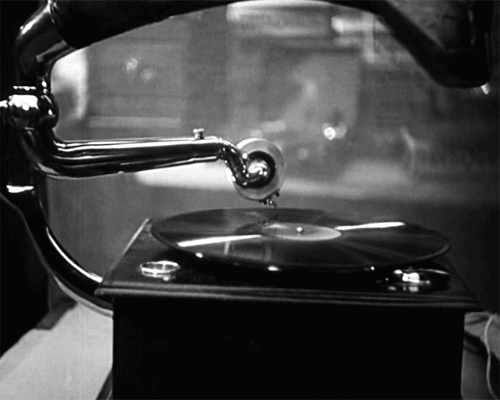Todos os dias eu durmo e acordo com um poster de
“A Nós a Liberdade” em cima da cabeceira da minha cama. Dos oito posters que
enfeitam o meu quarto, este é o mais esquisito, o mais diferente, o que
representa o filme mais desconhecido de todos ali. Escolhi-o não pela estética
(embora a ilustração seja adorável), mas pelo meu grande amor por este filme,
sem dúvida meu favorito de todo o maravilhoso cinema francês.
Every day I go to sleep and wake up with an “À Nous La
Liberté” poster over my bed. I have eight movie posters in my bedroom, and this
one is the weirdest, the most different, the only one from an obscure movie. I
chose it not because of esthetical issues (OK, the illustration IS adorable),
but because I love this film a lot, and it is without a doubt my favorite
French film of all time.
Vi o filme pela primeira vez apenas com o intuito
de riscá-lo da lista dos “1001 filmes para ver antes de morrer”. Mas ele me
pegou de jeito, me conquistou, me surpreendeu, e se tornou inesquecível. A
primeira e óbvia surpresa foi a semelhança com “Tempos Modernos” (1936), o que
resultou até em um processo do estúdio francês em cima de Charles Chaplin.
I watched the film for the first time only because I
wanted to check it out from the list of the “1001 movies you should see before
you die”. But the film grabbed me, conquered me, surprised me, and became
unforgettable. The first and most obvious surprise was how it resembles “Modern
Times” (1936), and this fact led the French studio to sue Charles Chaplin.
Dois amigos estão na cadeia, e fazem juntos um
plano de fuga. Na hora de executar o plano, apenas um deles, Louis (Raymond
Cordy) consegue escapar. O outro amigo, Émile (Henri Marchand) vai ficar mais
algum tempo na cadeia. Louis consegue um emprego em uma fábrica e aos poucos
vai subindo de posto, até se tornar gerente. E é aí que o amigo volta a cruzar
sua vida: Émile consegue um emprego na linha de montagem da fábrica, e Louis
passa a temer que a verdade sobre seu passado seja descoberta.
Two friends are in jail,
and make a plan to escape. When they plan their plan to work, only one of them,
Louis (Raymond Cordy) escapes. The other pal, Émile (Henri Marchand) stays in
he jail a little longer. Louis gets a job in a factory and little by little he
gets promotions and becomes the manager. And then his friend returns: Émile
gets a job at the assembly line in the factory, and Louis fears that his
criminal past is discovered.
Mas a última coisa que Émile, um homem de bom
coração, quer fazer é chantagem. Seu desejo é conquistar Jeanne, secretária da
fábrica. E a animosidade entre Émile e Louis não dura muito: o tempo não mudou
a amizade dos dois.
But Émile has a heart of
gold, and he doesn't want to blackmail his old friend. His desire is to conquer
Jeanne, a secretary at the factory. And any hostility between Émile and Louis
is not something to last: time hasn't changed their friendship.
Você já deve conhecer a ousadia de “Os
Guarda-Chuvas do Amor”, de 1964, um filme em que tudo é dito através de música.
Não há diálogos, só música. Diferente? Sim! Inovador? Não. “A Nós a Liberdade”
também usa este recurso, e sua música é muito simples e repetitiva. Mas isso
não é um problema: o cinema no mundo todo estava aprendendo a falar, e a canção
dá uma cadência especial à obra – como a repetição de ações em uma linha de
montagem. Posso dizer sem medo que “A Nós a Liberdade” é o primeiro musical de
altíssima qualidade da história.
You must already have
heard about “The Umbrellas of Cherbourg” (1964), a film in which everything is
said through music. There is no dialog, only music. Different? Yes!
Groundbreaking? No. “À Nous la Liberté” also used this resource, and its music
is very simple and repetitive. But this is not all: cinema all over the world
was learning how to talk, and the song gives a special rhythm to the film –
like the repeated actions done in the assembly line. I can say with no fear
that “À Nous la Liberté” is the first top-notch musical in film history.
 |
| René Clair |
René Clair não estava nem um pouco satisfeito com
a chegada do som ao cinema. Em seus primeiros filmes falados, ele fez muitas
experimentações, como a deste filme envolvendo supostas flores cantantes e um
toca-discos. Se os filmes mudos de René Clair usavam muito da fantasia, seus
primeiros filmes falados tinham também um toque fantástico no uso do som, que
era tudo, menos realista. E o mais interessante em “A Nós a Liberdade” é o fato
de a fábrica onde Louis e Émile trabalham ser um local que fabrica justamente vitrolas
– ou seja, a nova vida dos amigos gira em torno do som.
René Clair wasn't happy
with the arrival of sound. In his first sound films, he did many experiences,
and in this film here we have one involving singing flowers and a phonograph.
If René Clair's silent films had a lot of fantasy, his early talkies had a
fantastical touch in the use of sound, that was never used realistically. And
the most interesting thing to notice in “À Nous la Liberté” is that Louis and
Émile work in a phonograph factory – their life now is built around sound.
“A Nós a Liberdade” é um filme que me faz sentir
bem. Sempre paro para ver quando ele está na televisão. Há comédia, romance,
crítica social, ação, amizade e música em apenas 82 minutos de filme. E, o que
mais me atrai, é um filme com um desfecho não previsível (a imagem do pôster
foi inspirada nas cenas finais). É um filme lindo, inovador, e meu favorito de
toda a história do cinema francês. J'aime “À Nous la Liberté”!
“À Nous la Liberté” is a feel-good movie to me. I always stop and watch
it when it's on TV. There is comedy, romance, social issues, action, friendship
and music in only 82 minutes. And something that always atracts me: it is not a
film with a predictable ending (the image in the poster is inspired by the
final scenes). It is a beautiful, innovative movie, and my personal favorite of
all French cinema. J'aime “À Nous la Liberté”!


parece muito interessante. beijos, pedrita
ReplyDeleteOh this sounds like an awesome film. I've heard about it but never saw it. I love classic French films. Thanks for the great review!
ReplyDeleteDon't forget to read my entry as well :)
https://thewonderfulworldofcinema.wordpress.com/2016/05/19/oh-but-you-must-see-give-us-the-moon/
Hi Lê. You are right, À Nous la Liberté is the first top-notch musical film. I always feel happy watching it. Good essay.
ReplyDeleteNice review. I hope to see this on the big screen some day!
ReplyDeletereally interesting choice Le! I like how you mentioned what the film means to you- I like the story you wrote about the poster- so insightful about why you love this film! Great job
ReplyDeleteSuch interesting background of the film! I'm definitely adding it to my watchlist.
ReplyDeleteGostaria de baixar a versão dele estendida. Não estou conseguindo achar poderia me mandar o link.
ReplyDeleteGostaria de baixar a versão dele estendida. Não estou conseguindo achar poderia me mandar o link.
ReplyDelete